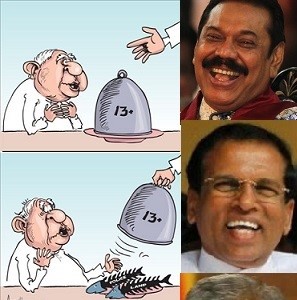Any attempt at a solution to Sri Lanka’s ethnic issue that does not have the consent and support of the majority Sinhalese Buddhists would be fruitless, former President Maithripala Sirisena said, calling for an all-party government to resolve the island nation’s multiple crises.
Speaking in parliament on Thursday February 09, Sirisena said it would be impossible to go ahead with any proposal that the Buddhist clergy objected to.
The former president was referring to a protest staged by a group of Buddhist monks near the parliament complex the previous day against the full implementation of the India-backed 13th amendment to the constitution.
“I have no idea why Mr Ranil Wickremesinghe at a time like this when there are so many problems in the country decided to tackle something that could set the two corners of the country ablaze,” said Sirisena.
Recounting the history of the 13th amendment, he said not a single past president including him had touched it despite pressure from the north.
“A majority of this country are Sinhalese Buddhists. It’s not right to do [something like this] by antagonising the majority. It can never be done,” he said.
“Nothing the Buddhist monks are opposed to can ever be attempted,” he added.
Instead, he said, Sri Lanka’s political establishment must unite in finding solutions to the country’s many problems.
“There is no point in divisively shouting in parliament.
“The president’s wish is that everyone works together. So let’s establish an all-party government and move ahead together to resolve the problems,” said Sirisena.
Wednesday’s protest took place as, not far away, President Wickreemsinghe was telling MPs that he is committed to devolving power to the provinces within a unitary state as a permanent solution to the island nation’s decades-long ethnic issue.
Tensions rose at the protest as police tried to block the monks who only dispersed after an official from the presidential secretariat spoke to them and assured a response from the president.
Some of the monks set fire to a copy of the 13th amendment in full view of the media and police personnel in a scene that was eerily reminiscent of Wickremesinghe’s United National Party (UNP) burning a draft bill of a new constitution presented to parliament by former President Chandrika Bandaranaike Kumaratunga’s government in 2000 also a solution to the conflict.
Despite Sirisena’s call for a united effort, Sri Lanka’s main opposition the Samagi Jana Balawegaya (SJB) has yet to make its views known on the rising opposition to the 13th amendment from nationalist quarters.
The SJB boycotted a recent all-party conference (APC) on the ethnic issue but said it supports devolution of power, though the party has yet to articulate its position on the amendment’s full implementation.
Wickremesinghe told parliament on Wednesday that there will be no division of the country, contrary to fears expressed by some Buddhist monks.
A small number of MPs on both sides of the aisle have expressed their opposition, but the president has said he will go ahead with full implementation.
The 13th amendment to Sri Lanka’s constitution emerged from the controversial Indo-Lanka Accord of 1987 as a purported solution to the worsening ethnic conflict, four years after war broke out. Provincial councils came in the wake of this amendment, though land and police powers have yet to be devolved to the provinces as originally envisioned. Both Sinhalese and Tamil nationalists have historically opposed the amendment, the former claiming it devolved too much, the latter complaining it didn’t devolve enough.
A full implementation of the amendment would see land and police powers devolved to the provinces, a development that is not likely to garner support from Sri Lanka’s more nationalist-oriented parties including sections of the ruling Sri Lanka Podujana Peramuna (SLPP).
Meanwhile, India has expressed its support for Wickremesinghe’s assurances that the amendment will be fully implemented. India’s support is crucial to the cash-strapped island nation as it struggles to recover from its worst currency crisis in decades. India has officially communicated to the International Monetary Fund (IMF) that it will support Sri Lakna’s debt restructuring process, which is a prerequisite for a desperately needed 2.9 billion dollar IMF bailout.


